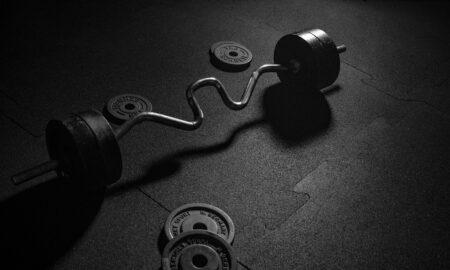Mike Mentzer: Let’s say, hypothetically, that everyone in this room is going to return in a year’next November 15’and we’re all going to be heavier. How much food will we have to eat to gain 10 pounds of pure muscle without adding any fat? Well, first of all, you’ve got to recognize that one pound of muscle tissue contains 600 calories. That’s true in all human beings. It’s true for Chris Lund, me, Arnold Schwarzenegger, you, you’everybody. If you were to surgically excise one pound of muscle tissue and place it in a device known as a calorimeter, it would give off 600 calories of heat. If you were to gain 10 pounds of muscle mass in one year, how many calories would you have to take in over and above your maintenance need of calories?
Audience member: Six thousand.
Mike Mentzer: Six thousand. [Mentzer turns to the chalkboard] If one pound of muscular mass contains 600 calories and you want to gain 10 pounds, then you’ve got to eat 600 x 10’or 6,000’calories a year over and above your maintenance need. That’s 6,000 extra calories a year’not 6,000 extra calories a day, a week, a month. We don’t think in terms of a year but in terms of days.
For the number of extra calories we’ll need every day, divide by 365, the number of days in a year. You come out with approximately 16 extra calories a day. You’re not going to grow 10 pounds of muscle, though, simply by eating 16 extra calories over and above maintenance. The process of eating contributes nothing to the growth process. What’s the first requisite?
Audience member: Stimulation.
Mike Mentzer: You’ve got to stimulate growth first. Keep in mind how minuscule growth is on a daily basis. You’ve got to train hard enough to stimulate growth first, then you’ve got to provide enough nutrition to maintain your existing physical mass’that’s where your maintenance need of calories comes in. Then you’ve got to provide just a tiny bit of extra nutrition for the growth you might stimulate on a daily basis.
I say might stimulate. The fact is that the majority of us in here already eat more than we need for growing 10 pounds of muscle a year. That’s why we’re all so ripped [audience laughs], because we’re getting too many calories. If you’re not growing muscular mass now and you’re eating sufficiently’and it’s obvious to me everybody in here is eating ‘sufficiently’ at least’then what’s the reason you’re not growing? You’re not training hard enough.
Very rarely is the answer to a growth problem nutrition, especially in America or Canada, because everybody eats more than adequately. I’m not suggesting that you count your calories this exactly every day to make sure that you grow just muscular mass. What I’m trying to point out by the arithmetic is that you don’t have to force-feed yourself hundreds or even thousands of extra calories a day, or hundreds of extra grams of protein, in the mistaken notion that in so doing you’ll hasten the muscle-growth process.
How many of you in here have an hourly feeding schedule or force-feed yourself hundreds of extra calories a day, thinking that you’re going to grow faster? We’ve all done that at one time or another.
Audience member: I was wondering about the best type of food for building 10 pounds of muscle.
Mike Mentzer: Well, that’s the next thing I want to talk about. I’ve been talking about ‘maintenance need’ of calories and saying that you need 16 calories a day more than maintenance to grow 10 pounds of muscle a year’given that you stimulated that growth first.
Audience member: You’re assuming 100 percent efficiency, that all of the calories you take in would be used for maintenance and growth.
Mike Mentzer: It doesn’t matter; you’re going to be getting more than that anyway, and there is a certain metabolic ‘cost’ in the growth process. So it may be 17 or 18 calories. I’m oversimplifying to give you an idea of how slow the muscle-growth process is and how little you need to eat to enable muscular growth.
Audience member: How do you maintain your muscle mass every day? How do you calculate that?
Mike Mentzer: You’ve got to stimulate growth first. Then you’ve got to eat enough to maintain your existing physical mass’that’s your maintenance calorie need. A certain number of calories maintains you every day: You don’t gain, you don’t lose. To grow 10 pounds a year, you have to tack on an extra 16 calories. That’s how you gain and lose weight.
How do you discover what your daily maintenance need is? Every day for five days write down every single thing you eat, from the milk you put in your coffee to the ketchup you put on your french fries’everything! Then, at the end of the day, sit down with a calorie-counting book and calculate your total number of calories for that day. Add your five total numbers and divide by five, and you have your daily average calorie intake.
Let’s say on Monday you take in 2,500 calories; on Tuesday, 2,700; the middle of the week, you’re getting tired and frustrated with your job, you have 4,500 calories and really pig out; on Thursday you feel guilty and have only 1,500 calories; Friday you’re back to normal, eating your daily average of about 2,500 calories. Don’t change your diet during that five-day period. Eat as close to normal as possible. What you want to find out is your daily average caloric intake over a representative five-day period. These five numbers add up to 13,700. Divide that by five, and your daily average calorie intake is 2,740. Now, if over the five-day period you haven’t gained or lost weight, what’s true of your daily average calorie intake?
Audience member: It’s your daily maintenance need of calories.
Mike Mentzer: That takes into account your basal metabolic rate and your voluntary physical activity output.
Audience member: What about people who have faster metabolisms?
Mike Mentzer: It doesn’t matter how fast your metabolism is. If you haven’t gained weight or lost weight on your daily average calorie intake, your basal metabolic rate’s already taken into account. That’s going to differ for everybody.
Audience member: I thought your body changed its metabolic efficiency according to whether you eat a large or a small meal.
Mike Mentzer: That’s what I’m saying; choose a representative five-day period.
Audience member: But you can eat more at certain times and not gain weight’
Mike Mentzer: As opposed to other times? Then you’re more active. Then you’re burning more calories. Your basal metabolic rate stays essentially the same unless your body composition is changing. Your bodyweight may stay the same, but when you increase your muscle-mass-to-fat ratio’then your metabolism will change.
Don’t change your diet’you want to find out what your daily maintenance need is. To gain 10 pounds of muscle a year, you tack on 16 calories and take in a grand total of 2,756. You can get 16 extra calories a day from two bites of an apple. Again, how many of us have been guilty of force-feeding ourselves extra calories a day in the mistaken notion that we’ll hasten the muscle-growth process? There’s no doubt that if you eat more, you’re going to grow faster’you will; you’ll grow fat faster. The muscle-growth process is not so simple. The first requisite for that is what?
Audience member: Stimulate growth.
Mike Mentzer: You stimulate growth first, then eat adequately to maintain your existing mass’2,740 calories’then eat just a tiny bit extra. It’s probably safe to assume that the majority of us in here already get more than 16 extra calories every day. So if you’re not growing, it’s not because of inadequate nutrition but inadequate intensity.
Audience member: Do you require any more or any less calories per day because of the muscle mass you have, as opposed to somebody else?
Mike Mentzer: That’s taken into account. I’d choose a five-day period and write down everything I eat. If I’m not gaining or losing weight, then that’s already taken into account.
Audience member: So it will make a difference’between you and a normal guy.
Mike Mentzer: It will make a difference, yeah, but that’s why I do it for myself and why you do it for yourself. You probably need fewer calories than I do. As your mass increases, you burn more calories’up to a certain point, beyond which you build physical mass where your metabolism actually slows down. I’m not sure where that point is, but I’ve noticed that the more massive a bodybuilder becomes beyond a certain point, he seems to require less and less food. The bigger bodybuilders, the really massive bodybuilders, can’t eat anything or they get fat very easily.
Lou Ferrigno always has a sweat going. It’s because all physical organisms create heat in proportion to their physical mass, and they radiate heat in proportion to their surface area. As you get bigger and bigger, your mass increases at a greater rate than your surface area can radiate the heat. The first thing your calories are used for is to maintain body heat, and as you get bigger and bigger, you need fewer calories because your surface area doesn’t grow fast enough to radiate the heat. Your body’s always getting warmer and warmer as you get bigger, so you need fewer calories.
Audience member: I was reading an article on Roy Callendar’how he trains between four and eight hours a day. Wouldn’t he need a tremendous amount of calories to maintain that?
Mike Mentzer: Yeah.
Audience member: So that wouldn’t even be practical for anybody to do.
Mike Mentzer: No.
Audience member: And your grocery bill would be ridiculous.
Editor’s note: For a complete presentation of Mike Mentzer’s Heavy Duty training system, consult his books Heavy Duty II and High Intensity Training the Mike Mentzer Way, available through the ad on page 205 of this issue, from Home Gym Warehouse, (800) 447-008, or at Mentzer’s official Web site, www.mikementzer .com.
John Little is available for phone consultation on Mike Mentzer’s Heavy Duty training system. For rates and information, contact Joanne Sharkey at (310) 316-4519 or at www.mikementzer .com, or see the ad referenced above.
Article copyright ‘ 2004, John Little. All rights reserved. Mike Mentzer quotations that appear in this series provided courtesy of Joanne Sharkey, ‘ 2004 and used with permission. IM




















You must be logged in to post a comment Login